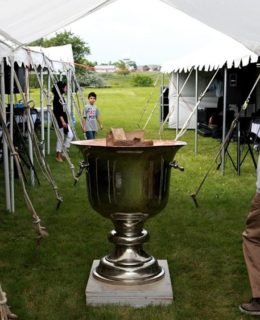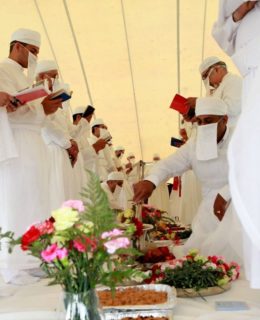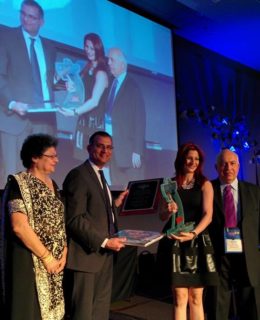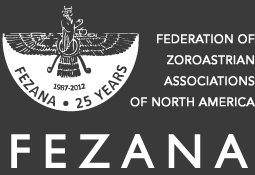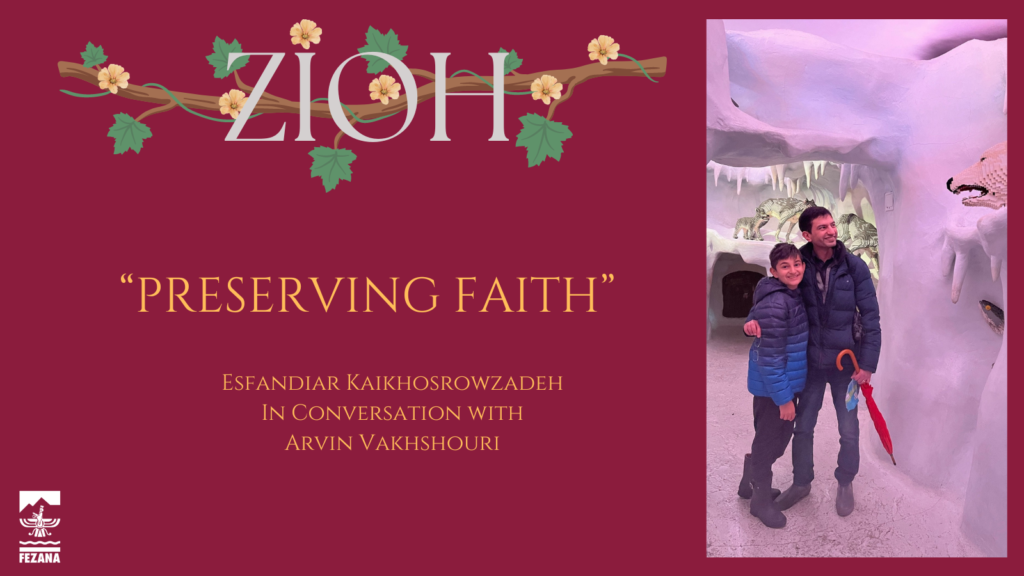
Youth: Arvin Vakhshouri
The interview with my uncle increased my learning about his stories of his immigration to the U.S. Understanding these stories can make other people around the world learn about the hardship of immigration and its challenges.
Participant: Esfandiar Kaikhosrowzadeh
The friendly talk with my nephew strengthened my relationship with him by sharing my life stories and showed how immigration can shape personal and cultural identity. I think sharing these stories can also educate others about complexity of immigration and its influence on personal life.
Preserving Faith: An Interview with Esfandiar Kaikhosrowzadeh
Interviewer: Arvin Vakhshouri
Date: 6/4/2023
Transcript
00:00:02 Interviewer
OK. Hello everyone. This is my uncle Estafandiar. He’s been living in America for the past thirteen years, which I think is quite a long time to answer my interview questions, which is why I think he’s a good candidate for this project.
00:00:20 Interviewee
So uh, let’s get started. Hi Estafandiar.
00:00:28 Interviewee
Hello Arvin, thank you for taking the time to talk today.
00:00:29 Interviewer
Yeah, and thanks for your time too. So, uh, my first question is: How was your life as a Zoroastrian before immigration while being in Iran?
00:00:47 Interviewee
Uh, I think, uh, I had a good childhood. I was born in Iran and raised in Iran, and I was surrounded by the Zoroastrian community and most of my friends were Zoroastrian. I remember my parents took me to the fire temple when the time was for praying and then gradually, when I grew up, I felt like I need to go to the fire temple, so I was going more often with my friends. My dad was a religious person, so he prayed at least one day, one time per day. I myself started to memorize part of Avesta and I knew state by state by heart. And I consider myself a religious person, a person that was born in a religious family and also was raised religious and I was practicing the Zoroastrian rules, and I was a religious person before my immigration.
00:02:04 Interviewer
Wow, that’s, that’s giving me a lot of curiosity now more about your life. So, second is why did you decide to come to the US? For example, like job benefits, global war, stuff like that.
00:02:19 Interviewee
I think you got it right there. I think when I graduated from school, uh, that was the time that it opened my eyes. And that was the time that I started to look for a career and looked into my future and see what they want to do for the future and what are the opportunities that they have.
00:02:40 Interviewee
And that was the time that I realized I’m living in a country where the majority of people are not Zoroastrian, and I am a Zoroastrian, as a minority, and because of that, there is a limitation for me. So, I cannot, I cannot pursue what I wanted to do, so that was, that was the eye-opening moment for me and that was the time that I started thinking about immigration.
00:03:10 Interviewer
Wow. Amazing story, right so far. And last but not least, how did you adapt to yourself while being in the U.S. for the past thirteen years?
00:03:24 Interviewee
So, actually when I came to the United States, I went to the part of the country that there wasn’t many Zoroastrian people around and I didn’t have a car at the time. So, it was very far the Zoroastrian Temple was very far from me. So, I couldn’t really go there. As a religious person coming to the United States, I really wanted to practice, but I didn’t have the opportunity. So, I remember one time I said OK, it’s Sunday morning. I want to pray, let’s go to church and see how I can adopt over there. So, I went to a church and I saw, you know they were doing their religious practice, but it was very different from what I knew from Zoroastrian culture, so I couldn’t do my religious exercise over there. So, I decided not to go back there. But then gradually I realized that there is not enough opportunity for me to practice my religion. I remember I didn’t have a calendar even to know which day of the month it is. When I wanted to pray to, you know, the “Beresad”, you know you gotta put that name in for the day and I didn’t know which day it is or if I wanted to, you know, not eat meat which we call it “Nabor”. So, if I wanted to not eat meat on certain days, I didn’t know which day is today. Is it the day that I am not supposed to eat meat or not? So gradually, I think what I was valuing as a religious person was fading and I couldn’t practice those.
And right now, when I’m in the community or in a part of the country that I have more opportunities and I have more Zoroastrian communities around me and some of my friends who I even know from Iran, when we get together, I see all of them also. They had the same opportunity as me and they were in the same situation as me, so when they came to U.S., they wanted to do and practice their religion, but they didn’t have the opportunity. And right now, uh, we are just looking into big celebrations like Nowruz, Jashne-Sadeh, which is the day that fire was discovered, or Jashn Mehregan or other big celebration, religious celebration, we just honor them. But then it’s not, it’s not like when we were in our home country, and we were celebrating all together and we were excited about these ceremonies way in advance. Yeah, I think…I don’t know if I answered your question or not.
00:06:30 Interviewer
Well, that had a lot of details and I like that. So, thank you for answering my questions. Thanks for your time, for being here. Anything else you want to add on before we end this meeting?
00:06:44 Interviewee
Thank you for your time too. Appreciate the opportunity. Have a good day. Bye.
00:06:51 Interviewer
Thank you. Bye.

